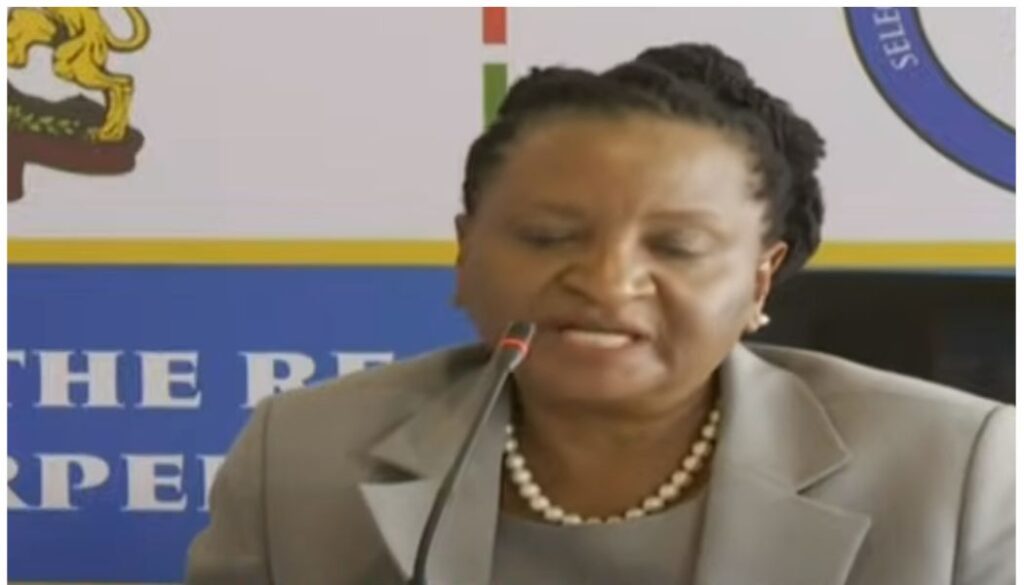Anne Amadi proposes polling stations to be reduced from 46,232 to 22,000

Anne Amadi proposes polling stations to be reduced from 46,232 to 22,000
Former Judiciary Chief Registrar Anne Amadi has proposed cutting the number of polling stations in Kenya by half, arguing that it would help reduce election costs.
Former Judiciary Chief Registrar Anne Amadi has raised concerns over gaps in Kenya’s electoral laws, warning that these shortcomings could hinder the Independent Electoral and Boundaries Commission (IEBC) from effectively executing its mandate.
Speaking during her interview for the IEBC chairperson’s position on Monday, Amadi cited the absence of key laws on referendums, campaign financing and boundary delimitation as major challenges that must be addressed urgently.
She stressed that the lack of a legal framework for conducting a referendum remains a critical gap.
“For example, we do not have a framework for conducting a referendum. If we needed to have one today, there would be a challenge. How do you even frame the referendum question?” Amadi asked.
She further noted that Article 100 of the Constitution, which provides for the inclusion of women, persons with disabilities and marginalised groups in governance has not been operationalised.
This, she argued, limits the country’s ability to fully implement constitutional principles.
Amadi also criticised the prolonged delays in resolving issues surrounding boundary delimitation and campaign financing, pointing out that the Supreme Court had yet to provide guidance on the matter.
“The campaign financing law would have helped to de-commercialise elections and improve accountability in campaign funding. However, it has been stuck in court since 2017 under a conservatory order,” she said.
She stressed the need for continuous engagement between the IEBC, Parliament and other stakeholders to address legislative gaps.
According to the former Judiciary registrar, some of these gaps require legislative intervention, while others could be resolved through administrative measures rather than waiting for Parliament to act.
“In Kenya, we tend to legislate on almost everything, even when some issues could be handled administratively. There should be room for policy frameworks instead of waiting for laws to be enacted for every single decision,” Amadi stated.
Amadi also proposed a drastic reduction in the number of polling stations in Kenya as a cost-cutting measure.
She suggested that the current 46,232 polling stations be cut down to 22,000, citing voter turnout trends that show, on average, only about 65 percent of registered voters participate in elections.
“Reducing the number of polling stations would lead to fewer resources being required, including security, transport, staff, and ballot boxes,” Amadi told the panel.
She argued that increasing the number of voters per polling station from the current 700 to 1,000 would be a practical administrative move that aligns with the government’s austerity measures.
With the IEBC estimating that it will need Sh61 billion to conduct the 2027 general elections, Amadi maintained that cutting costs should be a priority.
“The incoming team must work on multiple tasks simultaneously to ensure the IEBC operates within a stable legal framework,” she said.
Over Sh1.34 billion spent on non-existent projects at Public Works department; CoB
Anne Amadi addresses gold scam claims during tenure as Judiciary Chief Registrar
HELB announces 80% waiver for loan defaulters
Body parts found in River Sagana are of missing woman; DNA shows
All those shortlisted candidates for IEBC chair are ‘Yes’ People; ODM Senator
Mudavadi condemns attack on Peter Salasya at Nyayo Stadium
State advisory services take Sh480m in 6 months – CoB report
NCCK bans pulpit politics in member churches
On fostering internal cohesion within the commission, Amadi stated that if appointed IEBC chairperson, she would strive to maintain a good working relationship with both the commissioners and the secretariat to avoid internal conflicts.
“As a leader, it is the chair that plays a key role in setting the agenda. In so doing, it means that you ought to rally members around the vision that you have so that the agenda is supported and that the people have a common view and a shared understanding,” she said.
Amadi highlighted her experience as the secretary to the National Council on the Administration of Justice, a role that required extensive stakeholder engagement, strong communication skills, and governance expertise, as proof that she understands the scope of leadership at the commission.
“It is very clear to me where the role of the chairperson ends and where that of the secretary starts,” she said.
Amadi is among 11 candidates shortlisted for the position of IEBC chairperson. The selection panel has already begun conducting oral interviews for the chairperson and commissioners, with the process expected to conclude on April 24, 2025.
Gathoni Wamuchomba criticises Rigathi Gachagua
Former KTN journalist Nick Mudimba collapses and dies at his home
Security officer attached to State House Spokesperson Hussein Mohamed shoots man dead
Former MP dies at Kenyatta National Hospital
Uhuru urges leaders to listen to Kenyans’ cries as Ruto prepares for crucial Mt Kenya visit
Kenyan plane crash near Mogadishu, Somalia
Follow us




